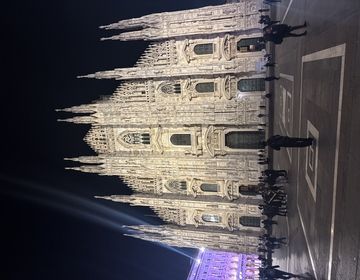Reflecting on Berlin and Sustainability
One of the things I was searching for in a study abroad program was a a host country with a component of sustainability. Most websites on the internet label Berlin as one of the most environmentally-friendly cities in the world. As a Sustainable Business co-major, I wanted a program that would offer sustainability courses and give me a new prespective on the subject.
After living in Berlin for a few weeks, there were many noticable differences to the way they approached sustainability compared to other cities in the U.S. One of the biggest differences was transportation. For such a large city, there didn't seem to ever be much traffic. Most people in Berlin walk, bike, or use public transportation. Almost every street in Berlin has wide bike lanes and barriers to protect the bikers. (It will definitely take a while to get used to checking for both bikes and cars when crossing the street!) I also noticed how much I relied on public transportation to get around compared to the U.S. I live in a suburb outside of Chicago, so if we are in the city at night, we often will have to Uber of get a ride home. I rarely used Uber in Berlin. The public transportation was extensive, safe, and ran most of the night. It was so cheap and convient, there was never a time where it would make more sense for me to order a ride. It was refreshing to be in a city that was developed around accessibility and walkability.
The two sustainability courses I was able to take abroad helped me gain a deeper understanding of Germany's approach to sustainability. The observations in Berlin's infrastructure I had noted previously were not random. Berlin, like many other German cities, was developed with sustainability in mind. The development focused on key sustainable features like walkability/accessability, greenspaces, and multi-use buildings. All of these aspects made Berlin more sustainable, but to me, the biggest factor is the collective mindset of the people. Every initative in Berlin works because the people believe in sustainability. The recycling program works because people take the time out of their day to sort it, and really care. There are so many thriftshops in the area because people want to reduce their consumption and buy second-hand.
Seeing how another country approaches a topic like sustainability is one reason why studying abroad was so valuable. I was able to understand a different way of thinking and bring it back home with me. The little habits I picked up abroad, like using reusable bags when I shop or walking everywhere, I will continue to do. No matter where I end up living, I'll be bringing a small piece of Berlin with me.
Related Posts
Embracing Independence on a Solo Trip to Rostock
By: Brooke Menzock One thing I’ve loved while being abroad is the independence and the freedom to go anywhere I want, whenever I want. As a very independent and adventurous... keep reading
Your Guide to CIEE's Enhanced Open Campus Block and Semester In Programs
Studying abroad should be as flexible and unique as you are – while also equipping you with the knowledge and skills you need to address the world’s most pressing challenges... keep reading
3 Cities in 5 Days? Challenge Accepted!
By: Madeline Passarello Throughout my time studying abroad I had so many amazing experiences. Studying in Berlin gave me the ability to travel to 15 different cities over the course... keep reading





